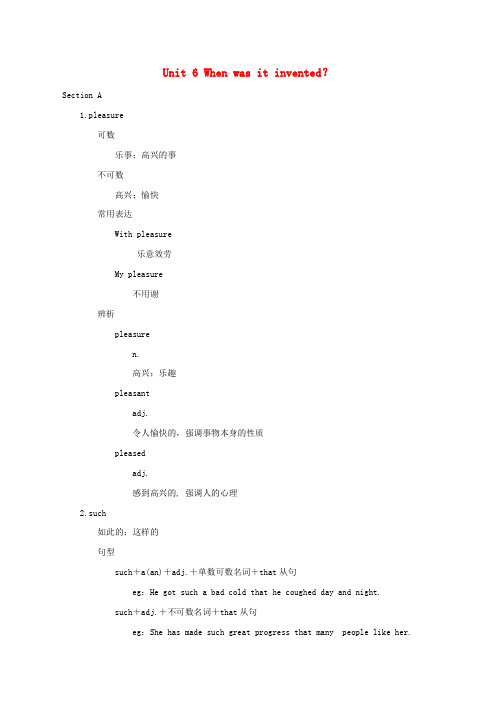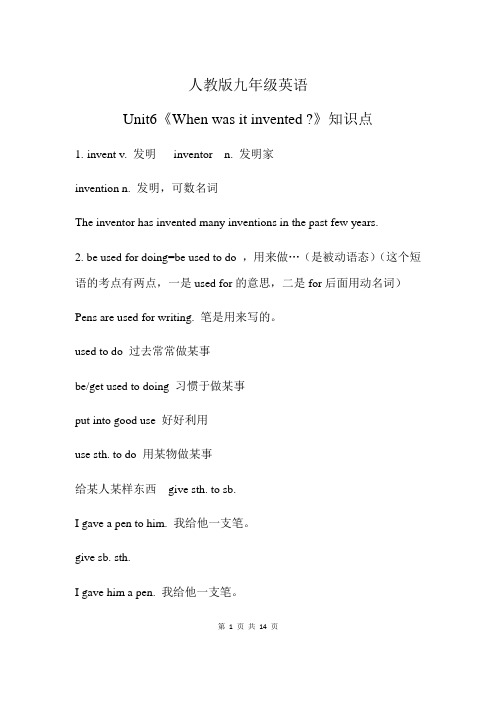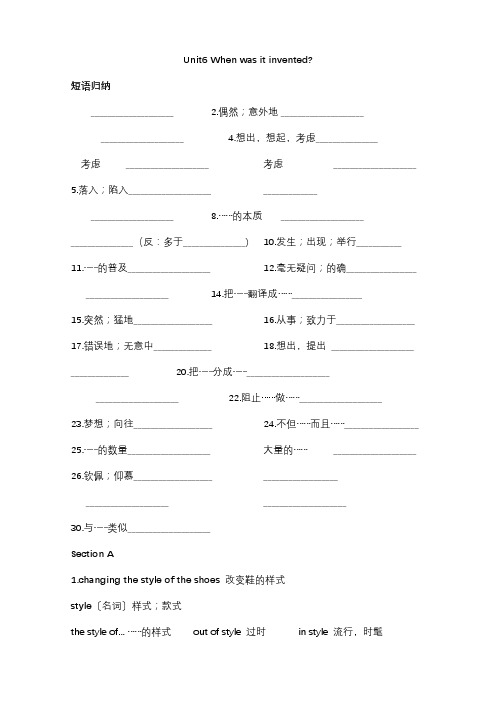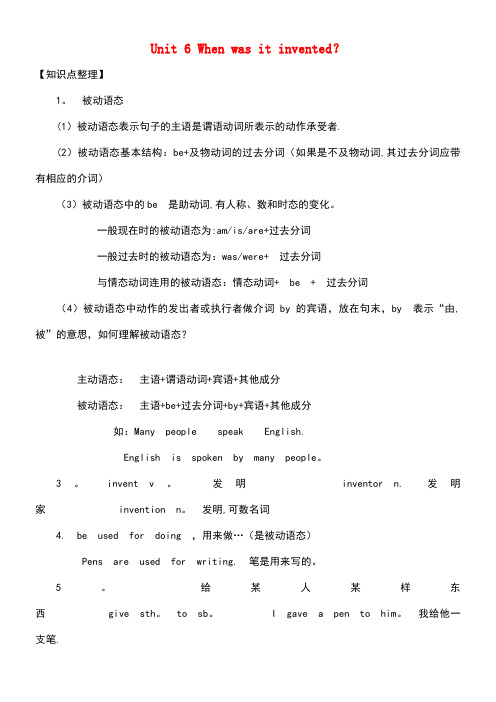人教版英语九年级Unit 6《When was it invented》知识点总结
九年级英语全册 Unit 6 When was it invented知识点汇总 (新版)人教新目标版

Unit 6 When was it invented?Section A1.pleasure可数乐事;高兴的事不可数高兴;愉快常用表达With pleasure乐意效劳My pleasure不用谢辨析pleasuren.高兴;乐趣pleasantadj.令人愉快的,强调事物本身的性质pleasedadj.感到高兴的, 强调人的心理2.such如此的;这样的句型such+a(an)+adj.+单数可数名词+that从句eg:He got such a bad cold that he coughed day and night.such+adj.+不可数名词+that从句eg:She has made such great progress that many people like her.such+adj.+名词复数+that从句eg:They are such interesting books that we all like them.辨析such修饰名词He is such a kind man.so修饰形容词或副词He is so kind a man.3.daily=every dayn.日报People's Daily《人民日报》4.mention提到;说到句型Don't mention it感谢道歉mention sb./sth.(to sb.)(向某人)提起某人或某事mention doing sth.提到做某事5.It is said that...据说……=People say that...相同结构It is reported that...据报道……It is supposed that...据猜测……It is believed that...人们认为……It's known that...众所周知……6.辨析take place指事先安排的事情eg: Great changes have taken place in our city over the years.happen指偶然发生的事情eg:An accident happened in that street.7.doubtwithout doubt毫无疑问;的确doubt sth.怀疑某事eg:No one doubts his ability.8.at a low price以低价eg:This sweater is on sale at a low price.9.translate翻译translate... into ...把……翻译成……eg:Don't translate everything into Chinese when you read English articles. Section B1.by mistake错误地;无意中eg:I took your bag by mistake.2.the Olympics=the Olympic Games语动词常用复数形式eg:The 30th Olympics were heldin London in 2012.3.divide...into把……分成……eg: The teacher divided us into four teams.4.stop句型stop ...from ...阻止……做某事eg: Nothing can stop China from being stronger and stronger.stop sb. from doing sth.= prevent sb. from doing sth.=keep sb. from doing sth.eg:Can you stop kids from playing Glory of Kings ?5.就近原则not only ... but also...neither...nor..既不……也不…… (两者都不)either...or...不是……就是……there be 结构6.look up to钦佩;仰慕=admireeg: Lots of kids look up to Li Yifeng nowadays.仰起头看……eg: The girl is so short that she has to look up to her elder sister.7.hero复数:+es以o结尾加es变复数的名词黑人(Negro) 英雄(hero)爱吃西红柿 (tomato) 炒土豆(potato) Section A1.pleasure可数乐事;高兴的事不可数高兴;愉快常用表达With pleasure乐意效劳My pleasure不用谢辨析pleasuren.高兴;乐趣pleasantadj.令人愉快的,强调事物本身的性质pleasedadj.感到高兴的, 强调人的心理2.such如此的;这样的句型such+a(an)+adj.+单数可数名词+that从句eg:He got such a bad cold that he coughed day and night.such+adj.+不可数名词+that从句eg:She has made such great progress that many people like her.such+adj.+名词复数+that从句eg:They are such interesting books that we all like them.辨析such修饰名词He is such a kind man.so修饰形容词或副词He is so kind a man.3.daily=every dayn.日报People's Daily《人民日报》4.mention提到;说到句型Don't mention it感谢道歉mention sb./sth.(to sb.)(向某人)提起某人或某事mention doing sth.提到做某事5.It is said that...据说……=People say that...相同结构It is reported that...据报道……It is supposed that...据猜测……It is believed that...人们认为……It's known that...众所周知……6.辨析take place指事先安排的事情eg: Great changes have taken place in our city over the years.happen指偶然发生的事情eg:An accident happened in that street.7.doubtwithout doubt毫无疑问;的确doubt sth.怀疑某事eg:No one doubts his ability.8.at a low price以低价eg:This sweater is on sale at a low price.9.translate翻译translate... into ...把……翻译成……eg:Don't translate everything into Chinese when you read English articles. Section B1.by mistake错误地;无意中eg:I took your bag by mistake.2.the Olympics=the Olympic Games语动词常用复数形式eg:The 30th Olympics were heldin London in 2012.3.divide...into把……分成……eg: The teacher divided us into four teams.4.stop句型stop ...from ...阻止……做某事eg: Nothing can stop China from being stronger and stronger.stop sb. from doing sth.= prevent sb. from doing sth.=keep sb. from doing sth.eg:Can you stop kids from playing Glory of Kings ?5.就近原则not only ... but also...neither...nor..既不……也不…… (两者都不)either...or...不是……就是……there be 结构6.look up to钦佩;仰慕=admireeg: Lots of kids look up to Li Yifeng nowadays.仰起头看……eg: The girl is so short that she has to look up to her elder sister.7.hero复数:+es以o结尾加es变复数的名词黑人(Negro) 英雄(hero)爱吃西红柿 (tomato) 炒土豆(potato)。
人教版九年级英语Unit6知识点总结

人教版九年级英语Unit6《When was it invented ?》知识点1.invent v. 发明inventor n. 发明家invention n. 发明,可数名词The inventor has invented many inventions in the past few years.2. be used for doing=be used to do ,用来做…(是被动语态)(这个短语的考点有两点,一是used for的意思,二是for后面用动名词)Pens are used for writing. 笔是用来写的。
used to do 过去常常做某事be/get used to doing 习惯于做某事put into good use 好好利用use sth. to do 用某物做某事给某人某样东西give sth. to sb.I gave a pen to him. 我给他一支笔。
give sb. sth.I gave him a pen. 我给他一支笔。
第 1 页共14 页pass/offer /send/show/write/bring/sell/lend/serve/ tobuy/cook/make/get/sing/prepare for4. all day 整天all evening/night the whole day5. salty adj. 咸的salt n. 盐sour/sweet/bitter/hot/salty酸甜苦辣咸6. by mistake 错误地(犯错是:make mistakes=make a mistake,这些常见的短语大家务必要掌握)I took the umbrella by mistake. 我不小心拿错了雨伞。
7. by accident/chance 意外,偶然(常见短语,考的最多的是它的意思)I met her by accident at bus stop.我在公共汽车站意外地见到了她。
Unit6Whenwasitinvented?知识梳理人教版英语九年级全册

Unit6 When was it invented?短语归纳____________________ 2.偶然;意外地 ________________________________________ 4.想出,想起,考虑_______________考虑____________________ 考虑____________________ 5.落入;陷入____________________ _________________________________ 8.……的本质___________________________________(反:多于_______________) 10.发生;出现;举行___________ 11.……的普及____________________ 12.毫无疑问;的确_____________________________________ 14.把……翻译成……_________________15.突然;猛地___________________ 16.从事;致力于___________________ 17.错误地;无意中______________ 18.想出,提出____________________ ______________ 20.把……分成……________________________________________ 22.阻止……做……____________________23.梦想;向往___________________ 24.不但……而且……__________________25.……的数量____________________ 大量的……____________________26.钦佩;仰慕___________________ ______________________________________ ____________________30.与……类似____________________Section A1.changing the style of the shoes改变鞋的样式style〔名词〕样式;款式the style of... ……的样式out of style 过时in style 流行,时髦The style of the blouse is my mother's favorite.2.—Can you help me think of an invention?你能帮我想个发明吗?—With pleasure!乐意效劳!1) Can you do...?你能做……吗?此句型表示客气地请求某人做某事,其肯定回答一般为“Sure, I'd love/like to./With pleasure.”。
九年级英语全册-Unit-6-When-was-it-invented?知识点总结-(新版)人教新目标版

Unit 6 When was it invented? 【重点单词】1. project n. 项目,工程;2. pleasure n. 高兴,愉快;3. daily adj. 日常的,每日的;4. mention v. 提到,说到;5. nearly adv.几乎,差不多;6. boil v. 煮沸,烧开;7. remain v. 保持不变;剩余;8. national adj.国家的,民族的;9. low adj.低的,矮的;10. translate v. 翻译;11. lock v.锁上;n. 锁;12. sudden adj. 突然的13. crispy adj. 脆的;酥脆的;14. salty adj. 咸的;15. sour adj. 酸的,有酸味的;16. customer n. 顾客。
17. Canadian 加拿大的,18. divide v. 分开,分散;19. hero n 英雄,男主角;20. professional adj. 职业的,专业的;【重点词组】1. shoes with special heels 特殊后跟的鞋子2. hot ice cream scoop 热的冰其淋勺子3. run on electricity 电动的4. be used for 被用作5. the subject for my school project 学校项目的课题6. our daily lives 我们的日常生活7. have a point 有点道理8. by accident 偶然,意外地9. over the open fire 在火堆上10. fall into the water 落入水中11. take place 发生12. without doubt 毫无疑问13. at a low price 以一个很低的价格14. translate the book into different language 把书翻译成不同种的语言15. all of sudden 突然16. by mistake 错误地17. a much-loved and active sport 一个深受喜爱并且积极的运动18. divide…into 把…分开19. stop sb. from doing sth. 阻止某人做某事20. look up to 钦佩,仰慕21. the professional basketball groups 职业篮球机构22. use someone else’s idea 借用其他人的想法【重点句式】1. I think the TV was invented before the car. 我认为电视是在轿车之前发明的。
初三英语上册(人教新目标)Unit6Whenwasitinvented知识点总结

初三英语上册(人教新目标)Unit 6 When was it invented?知识点总结一、重点辞汇·原文再现They are used for changing the style of the shoes.它们被用于改变鞋的样式。
·大体用法style n. 样式;样式Our children's different needs and learning styles created many problems.孩子们不同的需求和学习方式给咱们带来了许多问题。
·知识拓展---相关短语learning style 学习方式,学习风格life style 生活方式hair style 发型out of style 过时的Her dress is out of style.她的穿着不时兴。
·原文再现The subject for my school project is "Small inventions that changed the world."学校课题的题目是:改变世界的小发明“·大体用法project n. 项目;工程Project Hope 希望工程The project will create up to 40 new jobs.这项工程将提供40个新的工作职位。
·知识拓展---其他词性project v. 计划(plan)The next edition of the book is projected for publication in March.本书的下一版计划于三月发行。
·原文再现--Can you help me think of an invention?你能帮忙我想一个发明吗?--My pleasure!我很荣幸。
·大体用法pleasure n. 高兴;愉快Watching sport gave him great pleasure.观看体育比赛给他以极大的愉悦。
九年级英语全册Unit6Whenwasitinvented知识点讲解及练习素材人教新目标版(new)

Unit 6 When was it invented?【知识点整理】1。
被动语态(1)被动语态表示句子的主语是谓语动词所表示的动作承受者.(2)被动语态基本结构:be+及物动词的过去分词(如果是不及物动词,其过去分词应带有相应的介词)(3)被动语态中的be 是助动词,有人称、数和时态的变化。
一般现在时的被动语态为:am/is/are+过去分词一般过去时的被动语态为:was/were+ 过去分词与情态动词连用的被动语态:情态动词+ be + 过去分词(4)被动语态中动作的发出者或执行者做介词by的宾语,放在句末,by 表示“由,被”的意思,如何理解被动语态?主动语态:主语+谓语动词+宾语+其他成分被动语态:主语+be+过去分词+by+宾语+其他成分如:Many people speak English.English is spoken by many people。
3。
invent v。
发明inventor n. 发明家invention n。
发明,可数名词4. be used for doing ,用来做…(是被动语态)Pens are used for writing. 笔是用来写的。
5。
给某人某样东西give sth。
to sb。
I gave a pen to him。
我给他一支笔.give sb. sth。
I gave him a pen。
我给他一支笔。
6。
all day 整天7。
salty adj。
咸的salt n. 盐8. by mistake 错误地(犯错是:make mistake,这些常见的短语大家务必要掌握)I took the umbrella by mistake. 我不小心拿错了雨伞。
9。
make sb./sth+形容词:使…怎么样It made me happy。
它使我高兴make sb./sth+名词:让…做…It made me laugh。
它让我发笑10. by accident 意外,偶然(常见短语,考的最多的是它的意思)I met her by accident at bus stop. 我在公共汽车站意外地见到了她。
人教版九年级英语 Unit 6 When was it invented知识要点
人教版九年级英语Unit6 When was it invented?知识要点语法:1、被动语态(1). 被动语态表示句子的主语是谓语动词所表示的动作承受者。
(2). 被动语态基本结构:be+及物动词的过去分词(如果是不用物动词,其过去分词应带有相应的介词)(3). 被动语态中的be 是助动词,有人称、数和时态的变化。
一般现在时被动语态为:am/is/are+过去分词一般过去时被动语态为:was/were+ 过去分词与情态动词连用的被动语态:情态动词+ be + 过去分词(4). 被动语态中动作的发出者或执行者做介词by的宾语,放在句末,by 表示“由,被”的意思2、如何理解被动语态?为更清晰、更深刻地理解被动语态的含义,可以将主动语态和被动语态的句子结构进行比较。
主动语态:主语+ 谓语动词+ 宾语+ 其他成分被动语态:主语+ be +过去分词+ by +宾语+其他成分如:被动语态English is spoken by many people.课文知识要点:1、When was it invented?它是什么时候发明的?invent v. 发明→inventor n. 发明家→invention n. 发明可数名词invent v. “发明”指发明创造出自然界本来不存在的东西,如工具、方法、手段、汽车、电器、合成材料等。
Bell invented the telephone. 贝尔发明了电话。
Smith invented a new teaching method. 史密斯发明了一种新的教学方法。
Edison, a great inventor, invented over 1’000 inventions all his life.2、What is it used for?它是用来做什么的?be used for“用来做…”;此短语中的for是介词,表示用途,后接名词或动词-ing形式。
初中英语人教新目标九年级全册Unit 6 When was it invented知识点
九年级英语全册Unit 6知识点【Useful expressions】1.have a point 有道理2.mention sth.to sb.3.shoes with special heels 有特殊鞋跟的鞋4.shoes with lights 带灯的鞋5.hot ice-cream scoop 可加热的冰激凌勺6.run on electricity 靠电力运行7.the style of the shoes 鞋的款式8.be used for ...被用来做……9.think of 想出10.With pleasure! 乐意效劳!11.such a great invention 如此伟大的一项发明12.in our daily lives 在我们的日常生活中13.the pioneers of different inventions 不同发明的先驱者14.by accident 偶然;意外地15.boil drinking water over an open fire 在篝火上烧水16.fall / drop into ...掉进……17.produce a nice smell 产生一种香味18.the saint of tea 茶圣19.in less than 100 years 在不到一百年的时间里20.national drink 国饮21.take place 发生;出现22.tea culture 茶文化23.without doubt 毫无疑问;的确24.understand the nature of tea 了解茶的本质25.sell ...at a low price 低价卖……26.translate ...into ...把……翻译成……27.all of a sudden 突然;猛地28.ring the bell 按门铃29.by mistake 错误地;无意中30.in the end 最后31.put lots of salt on ...在……上面撒很多盐32.a much-loved and active sport 一种备受欢迎而且剧烈的运动33.more than 超过;多于34.in history 历史上35.a college teacher 一位大学老师36.divide ...into 把……分开37.get the ball in the other team’s basket 把球投进对方篮筐38.at the same time 同时39.stop ...from doing ...阻止……做……40.dream of 梦想;幻想;向往41.not only ...but also ...不但……而且……42.the number of ...……的数量43.look up to these basketball heroes 钦佩 / 仰慕这些篮球英雄44.encourage sb.to do sth.鼓励某人做某事45.achieve their dreams 实现他们的梦想e up with 提出;想出47.lead to 导致【Target sentences】When was the telephone invented?I think it was invented in 1876.I think the TV was invented before the car.Think about how often it’s used in our daily lives.The pioneers of different inventions were listed there.But at that time, it wasn't used widely.How tea was invented by accident.The most popular drink in the world was invented by accident.9.The book describes how tea plants were grown and used to make tea.10.It is believed that tea was brought to Korea and Japan during the 6th and 7th centuries.11.The tea trade from China to Western countries took place in the 19th century.12.The Chinese are without doubt the ones who best understand the nature of tea.13.It is said that a Chinese ruler called Shen Nong was the first to discover tea as a drink.14.Potato chips were invented by mistake.15.The customer was happy in the end.16.Basketball was invented by a Canadian doct or …17.He was asked to think of a game that could be played in the winter.18.They need to stop the competing team from getting the ball into their own basket.19.Basketball has 3not only become a popular sport to play, but it has also becomea popular sport to watch.【Language points】1.changing the style of the shoesstyle /staɪl/ n. 样式;款式style在此处作可数名词。
九年级英语全册 Unit 6 When was it invented?知识点总结 (新版)人教新目标版
Unit 6 When was it invented? 【重点单词】1. project n. 项目,工程;2. pleasure n. 高兴,愉快;3. daily adj. 日常的,每日的;4. mention v. 提到,说到;5. nearly adv.几乎,差不多;6. boil v. 煮沸,烧开;7. remain v. 保持不变;剩余;8. national adj.国家的,民族的;9. low adj.低的,矮的;10. translate v.翻译;11. lock v.锁上;n. 锁;12. sudden adj. 突然的13. crispy adj. 脆的;酥脆的;14. salty adj.咸的;15. sour adj.酸的,有酸味的;16. customer n.顾客。
17. Canadian 加拿大的,18. divide v.分开,分散;19. hero n英雄,男主角;20. professional adj. 职业的,专业的;【重点词组】1. shoes with special heels 特殊后跟的鞋子2. hot ice cream scoop 热的冰其淋勺子3. run on electricity 电动的4. be used for 被用作5. the subject for my school project 学校项目的课题6. our daily lives 我们的日常生活7. have a point 有点道理8. by accident 偶然,意外地9. over the open fire 在火堆上10. fall into the water 落入水中11. take place 发生12. without doubt 毫无疑问13. at a low price 以一个很低的价格14. translate the book into different language 把书翻译成不同种的语言15. all of sudden 突然16. by mistake 错误地17. a much-loved and active sport 一个深受喜爱并且积极的运动18. divide…into 把…分开19. stop sb from doing sth 阻止某人做某事20. look up to 钦佩,仰慕21. the professional basketball groups 职业篮球机构22. use someone else’s idea 借用其他人的想法【重点句式】1. I think the TV was invented before the car. 我认为电视是在轿车之前发明的。
2016秋人教版英语九年级Unit 6《When was it invented》知识点总结
Unit 6 When was it invented?Section A1. invent v. 发明inventor n. 发明家invention n. 发明可数名词2. It’s used for scooping really cold ice cream. 它是用来舀很凉的冰激凌。
此句中be used 是被动语态形式,意为“被用来……”。
Be used for 意思是“被用来做……”,介词for表用途,后面加名词或动名词。
如:The key is used for locking the door. 这把钥匙是用来锁门的。
知识拓展:1)be used to do 表示“被用来做……”,used为动词过去分词,其中的to 为不定式符号,其后接动词原形,相当于be used for doing sth. 如:A hammer is used to drive in nails. = A hammer is used for driving in nails. 锤子是用来钉钉子的。
2)be used to (doing) sth. 表示“习惯于做……”。
如:He is used to living here. 他习惯于住在这儿。
3)used to do sth. 表示“过去常常干某事”He used to go to Beijing when be was young. 他年轻时常常去北京。
4)be used as 表示“把……用作……”,as 是介词,意为“作为”。
The piece of wood is used as a bench. 这块木头被用作凳子。
5) be used by 意为“被……使用”,强调使用者。
The car is used by our manager.3. operate用法:1)“操作”Can you operate the computer?2)“起作用,见效果” e.g. The sleeping pill operated at once.3)“经营,管理” e.g. The company operates ten factories.4)“动手术”operate on / upon sb. “给某人动手术”e.g. The doctor will operate on his mother next week.4. I think it would be better to have…我认为……比较好。
- 1、下载文档前请自行甄别文档内容的完整性,平台不提供额外的编辑、内容补充、找答案等附加服务。
- 2、"仅部分预览"的文档,不可在线预览部分如存在完整性等问题,可反馈申请退款(可完整预览的文档不适用该条件!)。
- 3、如文档侵犯您的权益,请联系客服反馈,我们会尽快为您处理(人工客服工作时间:9:00-18:30)。
Unit 6 When was it invented?Section A1. invent v. 发明inventor n. 发明家invention n. 发明可数名词2. It’s used for scooping really cold ice cream. 它是用来舀很凉的冰激凌。
此句中be used 是被动语态形式,意为“被用来……”。
Be used for 意思是“被用来做……”,介词for表用途,后面加名词或动名词。
如:The key is used for locking the door. 这把钥匙是用来锁门的。
知识拓展:1)be used to do 表示“被用来做……”,used为动词过去分词,其中的to 为不定式符号,其后接动词原形,相当于be used for doing sth. 如:A hammer is used to drive in nails. = A hammer is used for driving in nails. 锤子是用来钉钉子的。
2)be used to (doing) sth. 表示“习惯于做……”。
如:He is used to living here. 他习惯于住在这儿。
3)used to do sth. 表示“过去常常干某事”He used to go to Beijing when be was young. 他年轻时常常去北京。
4)be used as 表示“把……用作……”,as 是介词,意为“作为”。
The piece of wood is used as a bench. 这块木头被用作凳子。
5) be used by 意为“被……使用”,强调使用者。
The car is used by our manager.3. operate用法:1)“操作”Can you operate the computer?2)“起作用,见效果” e.g. The sleeping pill operated at once.3)“经营,管理” e.g. The company operates ten factories.4)“动手术”operate on / upon sb. “给某人动手术”e.g. The doctor will operate on his mother next week.4. I think it would be better to have…我认为……比较好。
1)would 在此处表示料想或猜想、揣测,指说话人主观上认为不是很确定的可能性,后接动词原形或完成式。
如:The study of Japanese would take much of your time.学日语可能会花费你很多时间。
2)It is better to do sth. … 意思是“最好做……”,it 是形式主语,动词不定式为真正的主语。
如:It’s better for him to go to school. = It’s better that he (should) go to school. 他最好去上学。
5. battery—operated adj. 电池控制的是名词+动词的运动分词构成的合成形容词Section B1. And he sprinkled lots of salt on them so they were salty. 他在它们上面撒了很多盐,所以它们很咸。
1)sprinkle 表示“撒(某物)于(某物的表面上);喷洒”。
常用结构:sprinkle A on B或sprinkle B with A. 如:Can I sprinkle some pepper on my food? 或Can I sprinkle my food with some pepper?我能把胡椒粉撒在我的食物上吗?2)salty是名词salt(盐)加后缀-y构成的形容词。
类似的词有:cloud→cloudy, hair→hairy, rose→rosy, wind→windy, rain →rainy, snow →snowy, sleep→sle epy2. The customer was happy in the end.顾客最后高兴了。
In the end 意为“最后,终于”,相当于finally, at last。
其后不接of 短语,强调“虽然最初……,最后还是产生了一个……结果”。
如:He did one experiment after another and in the end he succeeded.他做了一个又一个实验,最后终于成功了。
思维拓展1)at the end 指“在……的末端,在……尽头”,可表示时间和空间,后常接of 短语。
如:There is a shop at the end of the road. 在公路的尽头有一家商店。
I finished my novel at the end of 1999. 在1999年末,我完成了我的小说。
2)by the end 意思是“到……为止”,常与完成时态连用,通常指时间,后常与of 短语连用。
He had been to many countries by the end of 2000. 到2000年末时他已经去过许多国家。
3. by mistake 错误地如:I took the umbrella by mistake. 我不小心拿错了雨伞。
4. make sb./sth. +形容词使…怎么样It made me happy. 它使我高兴。
5. by accident 意外偶然I met her by accident at bus stop. 我在公共汽车站意外地见到了她。
6. Although tea wasn’t brought to the western world until 1610. T his beverage was discoveredover three thousand years before that. 尽管茶直到1610年才被带到西方国家,但是这种饮料在那之前三千年就已被发现了。
although 作连词,意思是“虽然,尽管”,引导让步状语从句,我们不能根据汉语习惯,在后面使用连词but,不过它可以与yet, still连用;状语从句中若主从句的主语相同,且从句谓语含有动词be,可将从句主语和动词be省略。
如:Although (it is) snowing, it was not very cold.虽然在下雪,但天气不是很冷。
7. according to +名词根据…如:according to an legend根据一个神话according to this article根据这篇文章8. fall into 落入掉进如:The leaf fell into the river. 叶子落入了河里。
fall down 摔倒如:She fell down from her bike. 她从她自行车摔倒了。
9. quite 非常adv. 与冠词a连用时,冠词a必须放在它的后面。
如:very 非常adv. 与冠词a连用时,冠词a必须放在它的前面。
如:quite a beautiful girl / a very beautiful girl 一个漂亮女孩注:当不与冠词a 连用时,两者可以互用如:I am very happy.=== I am quite happy. 我非常高兴。
10. in this way 这样11. pleased adj. 表示外部因素引起人发自内心的欣慰和愉快pleasant adj. 愉快高兴指天气、时间、旅行令人高兴愉快please v. 使高兴使同意Self check &Reading1. in the sixth century 在第6世纪2. travel around 周游3. It’s played by more than 100 million people in over 200 countries including China, …包括中国在内的二百多个国家的一亿多人打篮球。
1)more than 与over 在句中意思相同,意思是“多于……”。
2)including 是一个介词,意思是“其中(包括)”,其后可用名词、代词、V-ing形式等作宾语。
其反义词为excluding(除……之外,不包括)。
如:The singer sang many songs, including some of my favorite.这名歌手唱了许多歌曲,包括几首我最喜欢的。
We will go to the Great Wall next week, including Jim and Tom.包括吉姆和汤姆,我们下周将去长城。
4. Players move towards one end of the court while throwing the ball to each other.选手们在互相扔球的时候朝球场的一边移动。
1)towards 在句中的意思为“朝,向”,表示方向,相当于“to”。
如:She walks towards the river after dinner. 晚饭后,她朝河边走去。
2)while throwing the ball to each other 中省略了主语和be 动词,其完整的句子应为“while players are throwing the ball to each other”,此处是while 引导的时间状语从句中的省略。
如:Don’t talk loudly while (you’re) in the library.当你在图书馆时不要大声交谈。
3)throw 意思是“扔”;“向某人扔……”应为“ throw sth. to sb. ”也可以表示成“throw sth. at sb.”。
如:Please throw me a book. = Please throw a book to me.Don’t throw stones at my dog! 不要向我的狗投石头。
5. be born 出生He was born in Canada. 他在加拿大出生6. safety n. 安全safe adj. 安全的7. knock into 撞上(某人)8. divide sth. into …将…划分成..通常指将一个整体分成几个对应相对的部分如:Let’s divide ourselves into 4groups. 让我们把我们自己划成4组。
